

The Innovation of Loneliness. What you need to know about internet addiction. "Friends" Do You Social Media Addict 2. On Chat vs In Person. Physical effects of internet addiction. What Would You Give Up For the Internet. All the lonely Facebook friends: Study shows social media makes us MORE lonely and unhappy and LESS sociable. A new study shows that Facebook use can undermine well-being and increase lonelinessThe study found that the more time people spent on Facebook, the less happy they felt over time By Alex Greig Published: 22:04 GMT, 12 September 2013 | Updated: 22:04 GMT, 12 September 2013 A new study from the University of Michigan psychologist Ethan Kross shows how online social media, rather than making us feel connected, contributes to loneliness and reduces overall life-satisfaction.
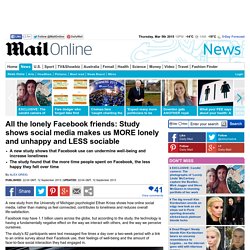
Why Facebook Makes You Feel Miserable. No surprise — those Facebook photos of your friends on vacation or celebrating a birthday party can make you feel lousy.
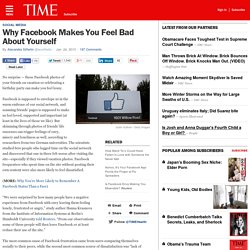
Facebook is supposed to envelope us in the warm embrace of our social network, and scanning friends’ pages is supposed to make us feel loved, supported and important (at least in the lives of those we like). But skimming through photos of friends’ life successes can trigger feelings of envy, misery and loneliness as well, according to researchers from two German universities. The scientists studied 600 people who logged time on the social network and discovered that one in three felt worse after visiting the site—especially if they viewed vacation photos. Facebook frequenters who spent time on the site without posting their own content were also more likely to feel dissatisfied. (MORE: Why You’re More Likely to Remember A Facebook Status Than a Face) Study: Social networks are making you distrustful and unhappy. Facebook's 2012 experiment, while controversial, showed that what other people post on social media can alter moods.
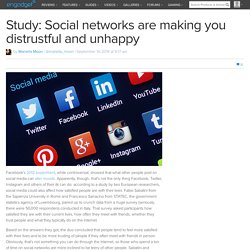
Apparently, though, that's not the only thing Facebook, Twitter, Instagram and others of their ilk can do: according to a study by two European researchers, social media could also affect how satisfied people are with their lives. Fabio Sabatini from the Sapienza University in Rome and Francesco Sarracino from STATEC, the government statistics agency of Luxembourg, paired up to crunch data from a huge survey (seriously, there were 50,000 responders) conducted in Italy. That survey asked participants how satisfied they are with their current lives, how often they meet with friends, whether they trust people and what they typically do on the internet. Based on the answers they got, the duo concluded that people tend to feel more satisfied with their lives and to be more trusting of people if they often meet with friends in person. Can Facebook make you sad? Studies suggest that browsing Facebook can make you unhappy, says Justin Mullins.
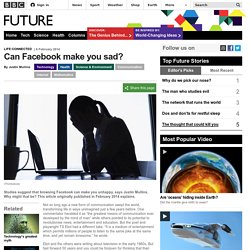
Why might that be? This article originally published in February 2014 explains. Not so long ago a new form of communication swept the world, transforming life in ways unimagined just a few years before. One commentator heralded it as “the greatest means of communication ever developed by the mind of man” while others pointed to its potential to revolutionise news, entertainment and education. Is Internet Addiction a Real Thing? Marc Potenza, a psychiatrist at Yale and the director of the school’s Program for Research on Impulsivity and Impulse Control Disorders, has been treating addiction for more than two decades.
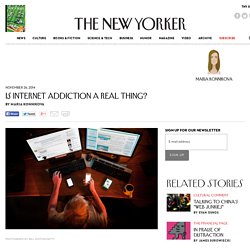
Early in his career, he, like most others studying addiction at the time, focussed on substance-abuse problems—cocaine and heroin addicts, alcoholics, and the like. Soon, however, he noticed patients with other problems that were more difficult to classify. There were, for example, the sufferers of trichotillomania, the inescapable urge to pull your hair until it falls out. Others had been committed for problem gambling: they couldn’t stop no matter how much debt they had accumulated. It was to this second class of behaviors—at the time, they were not called addictions—that he turned his attention.
Societal and cultural aspects of ICTs. Why Facebook Makes You Feel Miserable. The Limits of Friendship. Robin Dunbar came up with his eponymous number almost by accident.
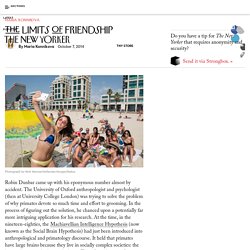
The University of Oxford anthropologist and psychologist (then at University College London) was trying to solve the problem of why primates devote so much time and effort to grooming. In the process of figuring out the solution, he chanced upon a potentially far more intriguing application for his research. At the time, in the nineteen-eighties, the Machiavellian Intelligence Hypothesis (now known as the Social Brain Hypothesis) had just been introduced into anthropological and primatology discourse. It held that primates have large brains because they live in socially complex societies: the larger the group, the larger the brain.
Thus, from the size of an animal’s neocortex, the frontal lobe in particular, you could theoretically predict the group size for that animal. Are social Networking Sites Replacing Real Life Socialising? There is a statement by famous sociologist Emile Durkheim that “Man cannot live without attachment to some object which transcends and survives him”.
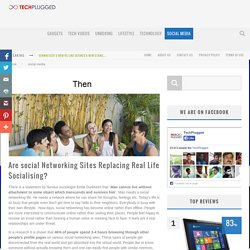
Man needs a social networking life. He needs a network where he can share his thoughts, feelings etc. Today’s life is so busy that people even don’t get time to say hello to their neighbors. Internet Addiction. What is Internet addiction?

Internet addiction is described as an impulse control disorder, which does not involve use of an intoxicating drug and is very similar to pathological gambling. Some Internet users may develop an emotional attachment to on-line friends and activities they create on their computer screens. Internet users may enjoy aspects of the Internet that allow them to meet, socialize, and exchange ideas through the use of chat rooms, social networking websites, or "virtual communities. " Should DSM-V Designate “Internet Addiction” a Mental Disorder? How to Use Social Media as a Learning Tool. Social media is an ingrained part of today’s society.
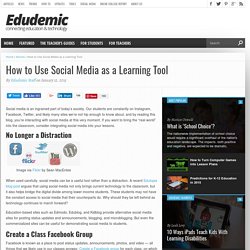
Our students are constantly on Instagram, Facebook, Twitter, and likely many sites we’re not hip enough to know about, and by reading this blog, you’re interacting with social media at this very moment. If you want to bring the “real world” into the classroom, consider integrating social media into your lessons. No Longer a Distraction Image via Flickr by Sean MacEntee When used carefully, social media can be a useful tool rather than a distraction. Is Facebook Making Us Lonely? - Stephen Marche. Yvette Vickers, a former Playboy playmate and B-movie star, best known for her role in Attack of the 50 Foot Woman, would have been 83 last August, but nobody knows exactly how old she was when she died.
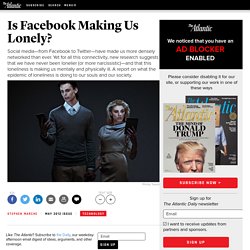
According to the Los Angeles coroner’s report, she lay dead for the better part of a year before a neighbor and fellow actress, a woman named Susan Savage, noticed cobwebs and yellowing letters in her mailbox, reached through a broken window to unlock the door, and pushed her way through the piles of junk mail and mounds of clothing that barricaded the house. Upstairs, she found Vickers’s body, mummified, near a heater that was still running. Her computer was on too, its glow permeating the empty space. Don't Blame Social Media if Your Teen Is Unsocial. It's Your Fault. Ben Wiseman Are teenagers losing their social skills? Parents and pundits seem to think so. Teens spend so much time online, we’re told, that they’re no longer able to handle the messy, intimate task of hanging out face-to-face.